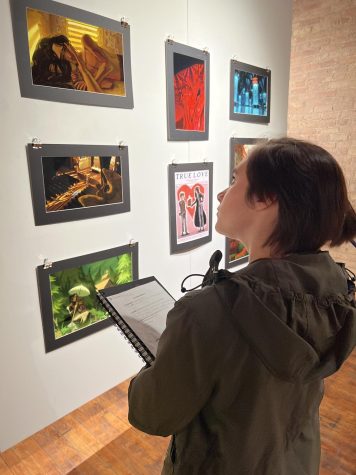Annual Book Talks Provide for Varied Conversation
October 28, 2015
The hallway is desolate, except for a single student walking leisurely to the bathroom.
All that can be heard is the soft patter of their footsteps.
All else is silent.
The English hallway has been taken over.
By book talks.
To anyone passing by, the emptiness of the A wing during first, second, third and fourth period on Aug. 21 would have given an illusion that students were most likely listening to lectures and chewing on pens to stay awake as is custom when one thinks of high school.
That couldn’t be more untrue.
Inside the classrooms, students engaged in self-directed discussions about their summer reading. Contrary to the dull appearance of the halls, the classrooms shined with conversation and activity.
Here’s a brief look inside:
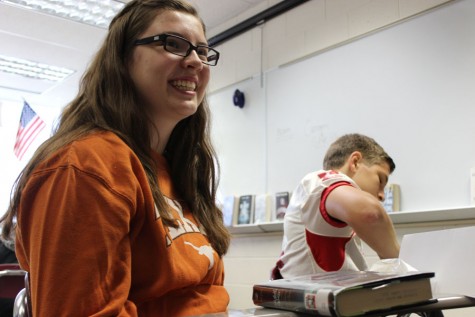
“I [liked] the different genres [presented],” sophomore Maren Gustavsen said of the book talk. Her novel of choice, Aristotle and Dante Discover the Secrets of the Universe by Benjamin Alire Sáenz, was suggested on the list of Abe Lincoln Literature Award nominees, which is where Gustavsen found out about it.
The Abraham Lincoln award is given to a book that has the highest number of student votes, according to illinois school media association (www.islma.org). Students read from a list of books that have been nominated for the award and vote on their favorite. The purpose is to encourage High School Students to read for pleasure. A complete list of Abe Lincoln Award nominees can be found in the Media Center.
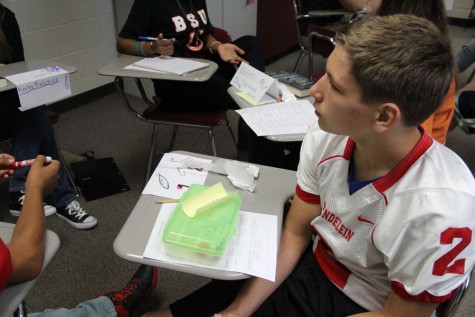
Junior Logan Kvien, listens as Sammy Escobar describes his novel. “I liked the ending,” He said of his own novel, Glitch by Heather Anastasiu. “[I liked that] it ended on a cliffhanger.”
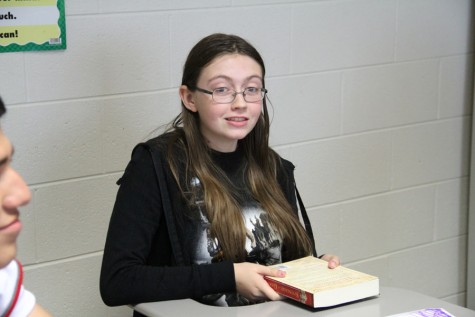
“[I liked that] we got free food.” said Junior Kaily Belcher. Many of the hosting teachers provided students with treats such as candy, cookies, or even iced tea.
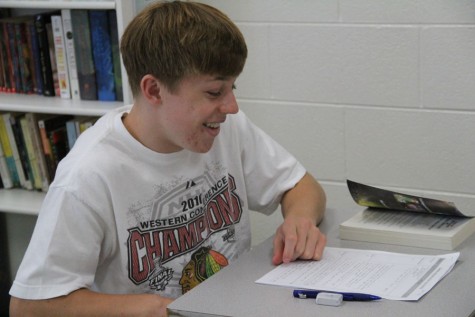
Junior Dylan Cline is also among those who enjoyed the book talks. “I don’t like talking in front of the class,” he said. “[This is better because it’s] easier talking to three or four people.” Rather than having to explain their summer reading to their entire class, students are divided into small groups of four to five people whom they take turns sharing information with.
The list of complaints were few and far between among students. Many enjoyed the ease and low pressure appeal of discussing novels which they picked for themselves instead of writing an essay or making a speech, like Cline mentioned above.
A common suggestion, or change, that did make the list was the time allowed for each discussion. Students were given between two and five minutes to discuss the details of their novel before receiving feedback from their peers. True to the diversity of our school, there were mixed opinions.
“I didn’t like the time constraint,” said Junior Jessica Peterson.
On the other hand, some students believed the problem lay in that there was too much time.
Said Junior Maren Gustavsen, “Five minutes [was] a little long.”
But even staff members appeared to show positive responses to the student-run discussions. One in particular was English teacher and literary enthusiast Alexander Kapotas.
Said Kapotas, “[I like that] I hear great conversations.”
As for things he would suggest changing, he had nothing. Instead he said that he “believes it’s something that will grow on its own over time.”

